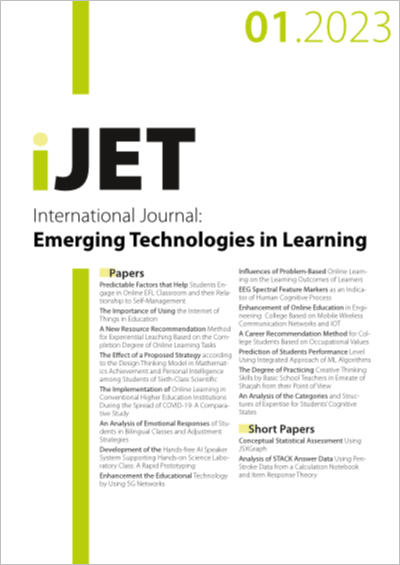A New Resource Recommendation Method for Experiential Leaching Based on the Completion Degree of Online Learning Tasks
DOI:
https://doi.org/10.3991/ijet.v18i01.37129Keywords:
online learning, task completion degree, Experiential Learning (ExL), learning resource recommendationAbstract
Experiential Learning (ExL) is an effective way to consolidate theoretical knowledge and deepen understandings, and the recommendation of ExL resources needs to also take the effect of students’ theoretical learning into consideration. However, existing studies generally ignore the stage-by-stage assessment of students’ completion of online learning tasks, and the recommendation performance of existing resource recommendation models for ExL is not satisfactory enough. Therefore, the recommendation method needs to be innovated, and the interpretability of recommendation results is facing challenges. To respond to these issues, this paper studied a new resource recommendation method for ExL based on the completion degree of online learning tasks. At first, the paper gave the principle of recommending ExL resources based on the completion degree of online learning tasks, and built an online learning task completion degree prediction model. Then, this paper adopted a bi-directional GRU network model based on attention mechanism to analyze the recent online learning behavior sequence of students and attain the completion degree of students’ short term learning tasks. After that, a knowledge map representing ExL resources and the correlation of knowledge attributes was drawn; by combining the completion degree of both the short-term and long-term learning tasks, the ExL resources suitable for students were recommended to them. At last, experimental results verified the effectiveness of the constructed model.
Downloads
Published
How to Cite
Issue
Section
License
Copyright (c) 2022 Nan Zhang (Submitter); Ligang Jia

This work is licensed under a Creative Commons Attribution 4.0 International License.



